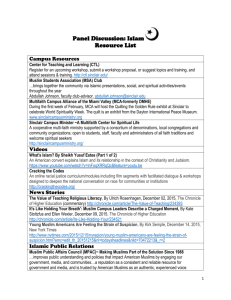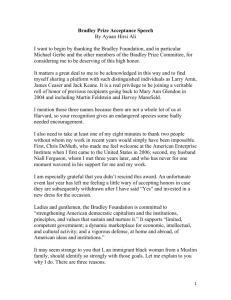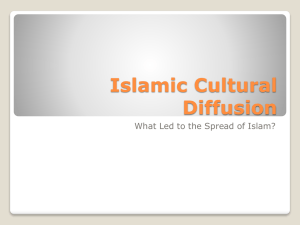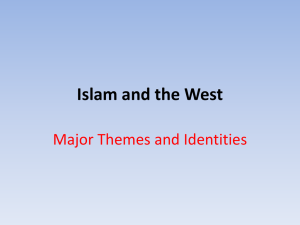What went wrong in the Netherlands?` (2005)
advertisement
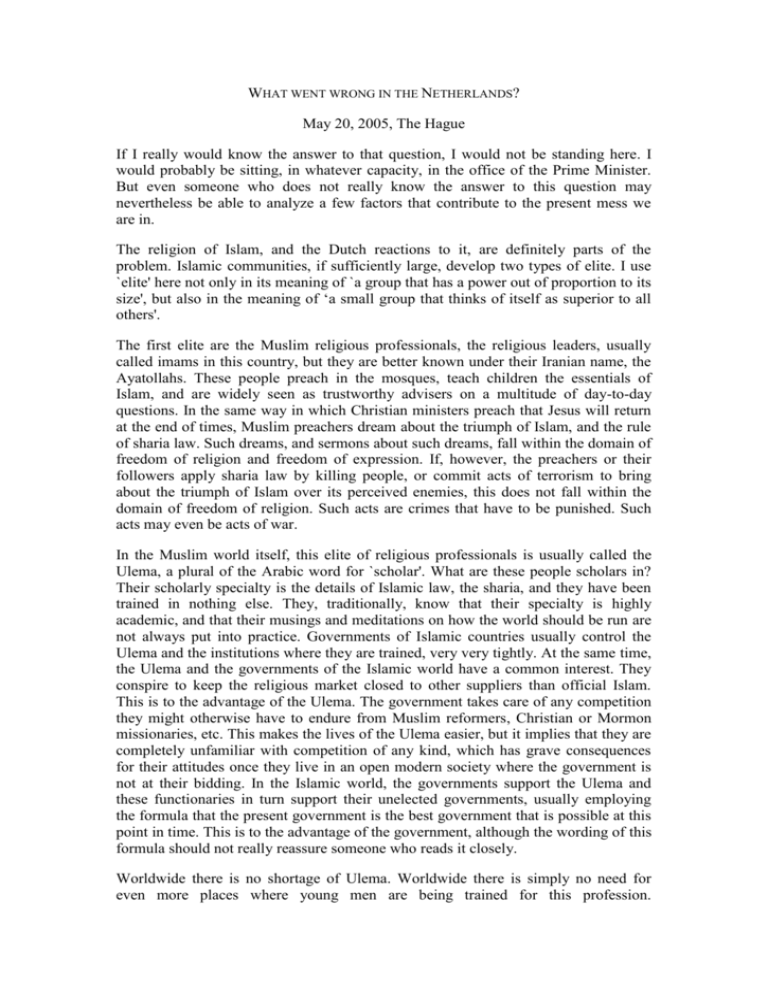
WHAT WENT WRONG IN THE NETHERLANDS? May 20, 2005, The Hague If I really would know the answer to that question, I would not be standing here. I would probably be sitting, in whatever capacity, in the office of the Prime Minister. But even someone who does not really know the answer to this question may nevertheless be able to analyze a few factors that contribute to the present mess we are in. The religion of Islam, and the Dutch reactions to it, are definitely parts of the problem. Islamic communities, if sufficiently large, develop two types of elite. I use `elite' here not only in its meaning of `a group that has a power out of proportion to its size', but also in the meaning of ‘a small group that thinks of itself as superior to all others'. The first elite are the Muslim religious professionals, the religious leaders, usually called imams in this country, but they are better known under their Iranian name, the Ayatollahs. These people preach in the mosques, teach children the essentials of Islam, and are widely seen as trustworthy advisers on a multitude of day-to-day questions. In the same way in which Christian ministers preach that Jesus will return at the end of times, Muslim preachers dream about the triumph of Islam, and the rule of sharia law. Such dreams, and sermons about such dreams, fall within the domain of freedom of religion and freedom of expression. If, however, the preachers or their followers apply sharia law by killing people, or commit acts of terrorism to bring about the triumph of Islam over its perceived enemies, this does not fall within the domain of freedom of religion. Such acts are crimes that have to be punished. Such acts may even be acts of war. In the Muslim world itself, this elite of religious professionals is usually called the Ulema, a plural of the Arabic word for `scholar'. What are these people scholars in? Their scholarly specialty is the details of Islamic law, the sharia, and they have been trained in nothing else. They, traditionally, know that their specialty is highly academic, and that their musings and meditations on how the world should be run are not always put into practice. Governments of Islamic countries usually control the Ulema and the institutions where they are trained, very very tightly. At the same time, the Ulema and the governments of the Islamic world have a common interest. They conspire to keep the religious market closed to other suppliers than official Islam. This is to the advantage of the Ulema. The government takes care of any competition they might otherwise have to endure from Muslim reformers, Christian or Mormon missionaries, etc. This makes the lives of the Ulema easier, but it implies that they are completely unfamiliar with competition of any kind, which has grave consequences for their attitudes once they live in an open modern society where the government is not at their bidding. In the Islamic world, the governments support the Ulema and these functionaries in turn support their unelected governments, usually employing the formula that the present government is the best government that is possible at this point in time. This is to the advantage of the government, although the wording of this formula should not really reassure someone who reads it closely. Worldwide there is no shortage of Ulema. Worldwide there is simply no need for even more places where young men are being trained for this profession. Consequently, the government of a small country like the Netherlands may very well desire to have its own centers in which such people are being trained, but here a very general rule of economics applies. There is simply no need to set up a factory where a product is being made that is made better and cheaper elsewhere. The second elite consists of young men in the age between 18 and 35. They do not think that the triumph of Islam is a dream. They do not think that applying a sharia punishment on someone like the filmmaker Theo van Gogh is a crime. They act out the dreams they hear being preached in the mosques, and they want people to fear Islam. They do not only want to intimidate non-Muslims. They especially want to intimidate dissident Muslims and apostates like Ayaan Hirsi Ali and many other less courageous apostates. These young men have often been particularly successful in carrying out their plans, and always in making people believe that they are no joke. Just one example: a few days ago a young woman in Afghanistan who presented local TV-programs was shot in the street by the members of such an elite. This kind of action is no doubt effective. Most Muslims know better than to irritate these young men, and keep their heads down. The existence and the activities of such an elite mute the discussions on Islam considerably, both here and within the Muslim world. They openly think of themselves as a vanguard, the troops moving at the head of what they see as the Muslim army. The Dutch government, simply put, has no clue on how to handle these two elites. They regularly, almost routinely, treat the imams as if they were the elected official representatives of the Muslims in this country. This contributes to the feelings of megalomania some of these imams harbor. Dutch criminal law equally has no answer to the aspirations and acts of the second elite, the testosterone-driven young men, since a few weeks in prison, or even years in prison, do not really frighten someone who is willing to die for Islam, and to kill for it. The Dutch cultural and political elite is not willing to consider the possibility that it is not they themselves who are guilty of the present predicament. The dominant feeling amongst the Dutch cultural elite is guilt. Calvinism may have something to do with this, this may morally excuse them, but `guilt' as a state of mind is an unpleasant and unproductive attitude. The two Muslim elites, the Ulema and the testosterone vanguard, openly say that they see the non-Muslim establishment of this country (or any other country) as their enemies and that they want to replace them. Nevertheless many if not most members of the Dutch elite feel that if they are seen as someone's enemy, this can only mean that they have not done enough good to the person who sees them as such. Moreover, the Dutch political elite are (with few exceptions) unable or unwilling to distinguish between, on the one hand, the roughly one million Muslim emigrants to this country and, on the other hand, these two elites, the Ulema and the young men vanguard. The Dutch cultural and political elite insists on seeing the Muslims as a religious minority like any other religious minority. They only other religious minority they know of, are the Jews. Consequently, absurd comparisons are made between the treatment of the Jews during the Second World War, and the treatment of the Muslims in the Netherlands today. Any open and rational discussion of the problems we are in is thus prevented. As if the Jews by assimilating or integrating into Dutch society could have prevented the fate the Germans had in stock for them. There are, however, several complicating factors. Muslims have dominated the world and their non-Muslim neighbors for about a thousand years. This happy millennium came visibly to an end when the siege of Vienna was lifted in 1683, when a Polish army chased the Muslim Turks away on September 11 of that year. Many Muslims resent this loss of domination, and they feel that the present dominant world power occupies this position illegally. Since Europe is full of politicians and thinkers of various caliber who equally resent being left behind, the emergence of a coalition of resentment is a real possibility. Such a coalition, may I call it Eurabia, is extremely dangerous, perhaps to the Land of the Free, but certainly to the Free World. There is, however, more to all this. May I take a few minutes of your time to try and explain something that at first sight may seem utterly unrelated to our present problems. As you all know, there are three monotheistic religions, Islam, Christianity and Judaism. In many aspects these religions are surprisingly similar. There are however, a surprising number of differences as well. Christianity, as you all know, is a missionary religion. Christianity is a religion that makes universal claims, and most if not all Christians believe that it is their Christian duty to preach the Christian gospel to each and every human being, and to convince literally everybody of the truth of its preaching. Christianity, however, has only limited interest in the legal details of the believers' daily life. Its focus is directed at intention and mentality. It is not a legalistic religion that prescribes and forbids. It lacks precise laws. There is, e.g., no Christian penal or civil code or a Christian law of inheritance. Judaism, on the contrary, is not a missionary religion. Judaism makes high demands on the daily life of its adherents, it issues hundreds of commands that its followers have to obey. The rabbis, the religious leaders in Judaism, are specialists on Jewish law, and exactly like jurists do in secular law systems, they prescribe or forbid the members of their congregations a multitude of actions. However, it is indifferent to them whether the rest of humanity obeys their instructions. Their mission is not universal, they do not have to convince the rest of humanity that their legalistic interpretation of monotheism is binding for others, too. Islam represents the third possibility within monotheism: it is both missionary and legalistic, in that it wants to prescribe in detail how humans should behave. It is unavoidable that this third possibility exists, if it would not exist it should be invented at once. But it makes Islam into something that is different from Judaism or Christianity. There is an Islamic law of inheritance. There are Islamic laws on very nearly everything. It is difficult to say whether the Christian claims to the universality of its message and the rabbinical insistence on a precise and legalistic approach to human behavior are the strength or the weakness of those respective religious traditions. It is simply a fact of life and history that Christianity preaches to everybody, but there is no Christian detailed code of law that regulates all aspects of human behavior. The synagogue, on the other hand, does not try to convert everybody, but unlike Christianity the synagogue dictates rules that are sharply defined and have to be followed by the elect - but only by them. To some, the problem with Islam is that it does both these things at the same time. Like Christianity, Islam is a missionary religion that wants to bring the Islamic message to the ends of the earth, but at the same time Islam dictates, like Judaism, a set of sharply defined rules that have, in principle, to be obeyed not just by the elect, but by everybody. Islam, so to say, combines the strong qualities of both Christianity and Judaism. Islam is both missionary and it knows a set of laws, embodied in the Sharia. The combination of these two traits calls for trouble, because it encourages Muslims to condemn the behavior of non-Muslims that happen to live with them within the same society. This condemnation may take several forms, one of them being harsh criticism of the secular societies of Europe or North America, of which Muslim immigrants became a part recently. Whereas Rabbis have little interest in the public or private behavior of their non Jewish surroundings, Muslim activists and Muslim preachers in the mosques certainly have such interests. Without hesitation, and publicly, they condemn their non-Muslim surroundings in the name of God himself. Since Western societies do have a strong tradition of self-criticism, Western societies underestimate the importance and the possible consequences of Muslim criticism that is directed at their way of life. The theory of Islam is not completely clear on the question whether non-Muslims, too, have to obey the rules of Islamic Law, but considerable numbers of Muslim leaders think so. There is, however, only one possibility to make non-Muslims obey these rules, and that is forcing them to do so. Forcing them to do so may not always be necessary since many non-Muslims are strangely eager to please their Muslim neighbors and adapt their opinions and their behavior to what Islam deems to be good. However, it is obvious that only the power of the State can guarantee the general application of the rules of Islam. Consequently many Muslims feel that the State should indeed be made into an instrument that enforces the application of Islamic Law. It goes without saying that no matter how well meant such aspirations may be, they are at variance with the constitutions of all Western countries. The non-separation of state and religion is moreover a guaranteed recipe for misery and backwardness, as we all can see daily in the Third World. Muslim criticism, however, is not only aimed at the particularities of the contemporary Western way of life. Also the very idea that non-Muslims in the West make their own laws and live without regard for Muslim law is offensive to large numbers of Muslims. Humans should not make their own laws when the Islamic divine laws are so readily available and, moreover, so widely known. Things become even worse, of course, when Muslims themselves show disregard for Islamic law, start to conduct themselves exactly like their European or American neighbors, and behave as if the laws of Islam did not exist. Then the Islamic apostasy laws may be invoked, which may have lethal consequences. But there is another perhaps even more serious aspect to the situation. In modern Western countries political parties attempt to get as many seats possible in elections that determine the composition of legislative bodies. These legislative bodies make laws and oversee their application. A number of questions now arises from this situation: Can Muslims participate in these activities? Why should Muslims participate in such essentially legislative political activities when they already possess Gods own laws, written down in the handbooks of sharia-law? Why, actually, should anybody participate in such activities if there are already divine laws available? Should such political activities perhaps be forbidden? Strictly speaking, there is no need at all (from the point of Islamic theology) for political activity by political parties that want to win seats in legislative councils. Islamic theology does not give humans the right to make their own laws: God gave them, in Islamic sharia law, all they might wish for or need. It is in this context that we should see the statements of one of the terrorist suspects brought to justice in the Netherlands in March 2005. According to the prosecution, the young man had wanted to blow up the Dutch House of Parliament, and had expressed the hope that it would be rebuilt as a sharia court. The confusion of the Dutch system about all this cannot be better illustrated than by the way the system counts the number of Muslims who live in this country. The Dutch system counts everybody as a Muslim who originates from a Muslim country, no questions asked. An immigrant and all his descendants are counted as Muslim, irrespective of what they say themselves - if anybody would take the trouble to ask. Whereas all religious groups in the Netherlands keep their own membership administration, and regularly report losses, there is no Islamic organization which keeps anything that can remotely be regarded as a membership administration. If we would count the Protestants and the Catholics in the same way, this country holds at least as many Catholics and Protestants as it did forty years ago, probably even more than that, which obviously is not the case. When we talk about one million Muslims in the Netherlands, this number is not based on any meaningful way of counting, registration or membership. It is simply the number of the original Muslim immigrants into this country, and their descendants. Hence, apostates are at present being counted as Muslims, and the number of one million definitely includes, for instance, Ayaan Hirsi Ali. Judging from the number of mosques in this country, or from the number of people from the Netherlands who go to the yearly pilgrimage in Mecca, there cannot be much more than half a million Muslims, perhaps even much less. Nobody knows. We do not know because we are being distracted from the reality of the Muslim immigrants into this country by two very vociferous and politically creative elites: the Ulema and the testosterone vanguard.





